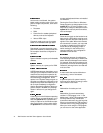
Glossary 9
Abbreviation for low voltage differential,
the technology used to implement Ultra2/
Wide SCSI, which offers data rates of
80 MB/sec, differential data integrity, ex-
tended SCSI cable lengths, and support
for up to 15 devices. Ultra2/Wide (LVD)
drives and controllers are backward com-
patible with Ultra/Wide drives and
controllers.
Abbreviation for meter(s).
Abbreviation for milliampere(s).
Abbreviation for milliampere-hour(s).
See coprocessor.
Abbreviation for megabit.
Abbreviation for megabyte(s). The term
megabyte
means 1,048,576 bytes; how-
ever, when referring to hard-disk drive
storage, the term is often rounded to
mean 1,000,000 bytes.
Abbreviation for megabytes per second.
Abbreviation for megabits per second.
Abbreviation for master boot record.
A computer can contain several different
forms of memory, such as RAM, ROM,
and video memory. Frequently, the word
memory
is used as a synonym for RAM;
for example, an unqualified statement
such as “a computer with 16 MB of mem-
ory” refers to a computer with 16 MB of
RAM.
A specific location, usually expressed as
a hexadecimal number, in the computer’s
RAM.
A utility that controls the implementation
of memory in addition to conventional
memory, such as extended or expanded
memory.
A small circuit board containing DRAM
chips that connects to the system board.
Abbreviation for megahertz.
Abbreviation for musical instrument digi-
tal interface.
Acronym for management information
format. A MIF file contains information,
status, and links to component instrumen-
tation. MIF files are installed into the MIF
database by the DMI service layer. The
content of a MIF is defined by a DTMF
working committee and is published in
the form of a MIF definition document.
This document identifies the groups and
attributes that are relevant to DMI-
manageable components.
Abbreviation for millimeter(s).
A device that allows your computer to
communicate with other computers over
telephone lines.
A pointing device that controls the
movement of the cursor on a screen.
Mouse-aware software allows you to ac-
tivate commands by clicking a mouse
button while pointing at objects displayed
on the screen.


















